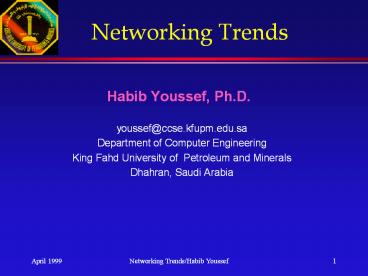Networking Trends - PowerPoint PPT Presentation
Title:
Networking Trends
Description:
Title: WWW Tutorial Author: Sadiq M. Sait Last modified by: ITC/ACS Created Date: 4/1/1996 8:38:30 PM Document presentation format: On-screen Show Other titles – PowerPoint PPT presentation
Number of Views:663
Avg rating:3.0/5.0
Title: Networking Trends
1
Networking Trends
- Habib Youssef, Ph.D.
- youssef_at_ccse.kfupm.edu.sa
- Department of Computer Engineering
- King Fahd University of Petroleum and Minerals
- Dhahran, Saudi Arabia
2
Overview
- Network Convergence
- Growth in Network Usage
- Application Trends
- Bandwidth Requirements
- Standardization
- Result Network Convergence
- Converged Network Architecture
- Consequences of Convergence
- Policy Based Management
3
Growth in Network Usage
- World wide web has permanently changed
networking. - Millions of individual users access the internet
from home regularly - Home offices are on the increase
- Businesses are using the Internet for commerce.
- Increasingly, individual organizations are
maintaining their own intranets
4
Internet User Growth
- World Wide Web Users in Millions
1996
2000
1999
1998
1997
1995
5
Current Trends in Applications
- Web pages now provide animated graphics, audio
video. - Ease of use is expected of applications.
- Number of functions are expected from a single
application (e.g., Web browsing, Mailing,
Calendaring etc.). - Diverse data types are expected to be handled by
a single application (e.g., Documents embedding
spread sheets, graphics, voice etc.)
6
Future Trends in Applications
- Entertainment on demand
- Movies, TV shows, Sports . on demand
- Video conferencing
- Online publishing
- Majority of books other publications will be
online - Electronic banking cash
- Electronic banking will displace checks cash in
commerce - Telecommuting
- Employees will perform jobs from remote locations
- Electronic sales
- Goods services will be sold by web
- Distance learning
7
Predicted Bandwidth Requirements
Two-way MPEG/ Video Conferencing
Internet Video
Telecommuting
WWW
Internet/FTP
8
Technology Trends
- Devices capable of integrating a number of
technologies are being designed and produced e.g.
a single switch may interface ATM, FDDI, fast
Ethernet. - Layer 2 and Layer 3 (IP switches) are being
designed and produced. - To meet increased bandwidth needs and application
sophistication new standards are being proposed. - Devices capable of prioritizing and filtering are
becoming available.
9
Technology
- Essential Technology characteristics to support
future - applications
- Manageability
- Policy responsive network, administrative
partitioning - Scalability
- Cost effective growth, bandwidth on demand, Usage
application based prioritization, multi vendor
solutions - Reliability
- Utility like uptime, self healing networks,
embedded security enforcement - Next generation features services
- Advanced application functionality, ability to
easily create new applications services
10
Standardization Efforts
- Standards are necessary to maintain flexibility
to avoid the clutches of proprietary designs.
Some forthcoming standards - ITU H323
- Supports packet switched networks to carry
telephony traffic - IEEE 802.1p, 802.1Q
- Support prioritization of data traffic at layer
2, this enables QoS - IETF RTP, ISLL, RTSP
- Real-time Transport Protocol, Integrated Services
over Specific Link Layers Real-Time Streaming
Protocol enable IP networks to carry multimedia
traffic
11
Case Example
Why should the company pay for separate
inter-branch telephone charges when the VPN could
carry voice traffic?
Leased Line / VPN
Head Office Network
Internet
Leased Line/ VPN
Leased Line/ VPN
Branch Office Network
Branch Office Network
12
Result Network Convergence
- Converged networking is an emerging technology
thrust that integrates voice, video data
traffic over a single network
13
Network Convergence
- Network Convergence entails convergence in
various aspects e.g. - Payload Convergence
- Different data types are carried in same
communications format (e.g., layer 1 audio
video streams as well as layer 3 packets may be
carried in layer3 datagrams ) - Protocol Convergence
- The move is away from multi-protocols to a single
protocol namely IP - Physical Convergence
- All payloads travel over the same physical
network (QoS CoS may however be used to
differentiate service requirements
14
Network Convergence (Contd..)
- Device Convergence
- A single switch may support Ethernet packet
forwarding, IP routing, ATM etc. - Application Convergence
- A single application integrates formerly separate
functions (e.g., Web pages allow interactive
communication) - Technology Convergence
- Same technology (e.g., ATM) is used for both LANs
WANs - Organizational Convergence
- Centralization of networking, telecommunication
computing services under a single authority
15
Converged Network Architecture
- A large converged network will probably be
composed of LANs and WANs - They will not be homogenous networks, due to
- Differing economic and performance requirements
over LANs and WANs - Differing bandwidth, delay and jitter
requirements - Two possible scenarios are presented.
16
Converged Network Example 1
- Edge network Switched or routed Ethernet
- Core Network ATM or Frame Relay etc.
LAN Edge Network
LAN Edge Network
WAN core network
17
Converged Network Example 2
- Parallel core networks
- Traffic is filtered into different service
classes at exit from LAN, and routed via
different networks - Connection oriented ATM for multimedia traffic
- Packet switched WAN for bursty LAN traffic
LAN Edge Network
LAN Edge Network
ATM
Packet Switched WAN
18
Summary
Explosive increase in Transmission Bit Rates And
Switching Capacities Abundant Computing power,
DSP, Compression etc. Distributed operating
systems, Middleware, Intelligent agents, Real
time database systems.
Deregulation/ Convergence
Technology
Globalization, Deregulation Increased
competition, Partnerships Rapid introduction of
Revenue generating services
Evolution in Network And Services
User Growth Appl. Sophistication
Anytime, Anywhere, Anymedia connectivity,
transparency, Flexibility, manageability,
Reliability
Standardization































